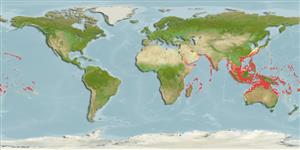Common names from other countries
>
Eupercaria/misc (Various families in series Eupercaria) >
Lutjanidae (Snappers) > Etelinae
Etymology: Aphareus: Greek, aphareys, -eos = water wings under the belly of female tunna (Ref. 45335).
More on author: Lacepède.
Environment: milieu / climate zone / depth range / distribution range
Écologie
marin récifal; profondeur 0 - 122 m (Ref. 9710). Tropical; 35°N - 31°S, 35°E - 134°W (Ref. 55)
Indo-Pacific: East Africa to the Hawaiian Islands, north to southern Japan, south to Australia. Reported from Cocos Island in the eastern Pacific (Ref. 9821).
Taille / Poids / Âge
Maturity: Lm ? range ? - ? cm
Max length : 70.0 cm TL mâle / non sexé; (Ref. 5484); common length : 25.0 cm SL mâle / non sexé; (Ref. 9821); poids max. publié: 906.00 g (Ref. 4887)
Épines dorsales (Total): 10; Rayons mous dorsaux (Total): 10-11; Épines anales 3; Rayons mous anaux: 8.
Adults inhabit inshore coral and rocky reefs and in clear waters of lagoons (Ref. 9821). Pelagic and benthopelagic (Ref. 58302). Occur singly or in small groups. Feed mainly on fishes, but also eat crustaceans. Individuals with brilliant yellow on head may be nuptial males (Ref. 9821). Often curious and approachable (Ref. 9710). Marketed fresh. Minimum depth reported taken from Ref. 128797.
Life cycle and mating behavior
Maturité | Reproduction | Frai | Œufs | Fécondité | Larves
Anderson, W.D. Jr. and G.R. Allen, 2001. Lutjanidae. Jobfishes. p. 2840-2918. In K.E. Carpenter and V. Niem (eds.) FAO species identification guide for fishery purposes. The living marine resources of the Western Central Pacific. Vol. 5. Bony fishes part 3 (Menidae to Pomacentridae). FAO, Rome. (Ref. 9821)
Statut dans la liste rouge de l'IUCN (Ref. 130435)
CITES (Ref. 128078)
Not Evaluated
Menace pour l'homme
Reports of ciguatera poisoning (Ref. 30298)
Utilisations par l'homme
Pêcheries: commercial; pêche sportive: oui
Plus d'informations
RéférencesAquacultureProfil d'aquacultureSouchesGénétiqueElectrophoresesHéritabilitéPathologiesTraitementMass conversion
Outils
Articles particuliers
Télécharger en XML
Sources Internet
Estimates based on models
Preferred temperature (Ref.
115969): 24.7 - 29.1, mean 28 (based on 1996 cells).
Phylogenetic diversity index (Ref.
82804): PD
50 = 0.7500 [Uniqueness, from 0.5 = low to 2.0 = high].
Bayesian length-weight: a=0.01738 (0.01020 - 0.02960), b=2.95 (2.81 - 3.09), in cm Total Length, based on LWR estimates for this species & (Sub)family-body (Ref.
93245).
Niveau trophique (Ref.
69278): 4.1 ±0.73 se; based on food items.
Résilience (Ref.
120179): Milieu, temps minimum de doublement de population : 1,4 à 4,4 années (tmax = 9).
Fishing Vulnerability (Ref.
59153): Moderate to high vulnerability (48 of 100).
